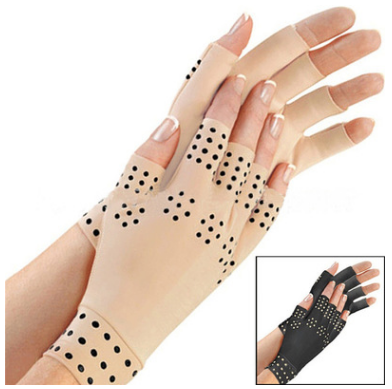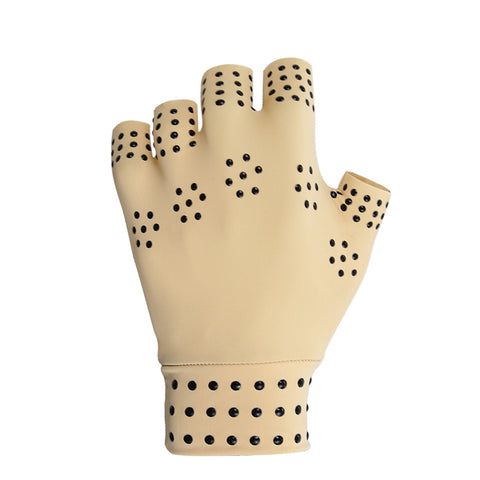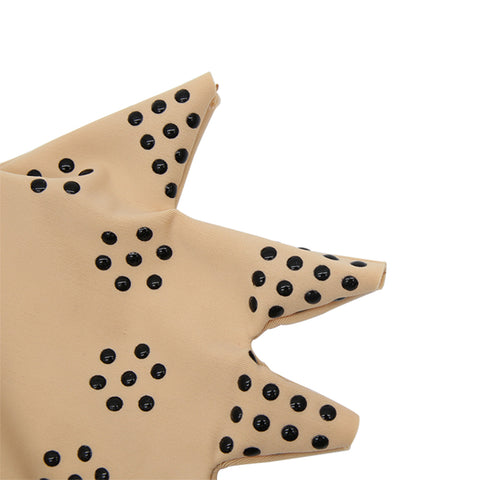Both inflammatory and osteoarthritis can cause pain, swelling, and stiffness in hands and fingers, and those of us who live with these conditions will look to almost anything to get relief. Enter arthritis gloves, which are tight, often fingerless gloves that purport to improve symptoms. But are they really effective?

How Arthritis Gloves Work
Arthritis gloves may work through several mechanisms. “Thermal gloves warm the hand, which can make you feel very comfortable and even take away some of the pain,” says Karen Jacobs, EdD, OT, OTR, CPE, FAOTA, a clinical professor at Boston University and an occupational therapist who works with arthritis patients.
Others are compression gloves that provide pressure. “Particularly when you’re having a flare in the fingers and joints and just feeling really uncomfortable, the compression seems to help reduce the swelling and can help with some joint stiffness as well,” says Jacobs. Compression may also improve blood circulation. Overall, arthritis gloves can make patients feel more relaxed and calm with a reduction in symptoms.

What Studies Say About Arthritis Gloves
Unfortunately, there isn’t a whole lot of science behind the gloves — yet, anyway. So far, studies have been inconclusive in proving that arthritis gloves actually improve symptoms. But anecdotally, many arthritis patients who use them have found relief. “I love my gloves and swear by them,” Tien Sydnor-Campbell, who lives with rheumatoid arthritis, told us on Facebook. Another arthritis patient, Sue Fundakowski, told us, “I wear them at night when I can’t sleep because my hands hurt too much. Helps a lot!”
As a professional OT, Jacobs says she will advise patients to wear arthritis gloves. “Occupational therapists sometimes do recommend gloves and that’s very appropriate,” she says. “If someone is saying, ‘I’m having a lot of pain and discomfort but I want to keep typing on the computer’ or ‘I want to continue playing squash or racquetball or tennis’ or ‘I want to keep gardening,’ the gloves may help them continue doing everyday activities and hobbies they enjoy.”

Should You Wear Arthritis Gloves?
There are some caveats to arthritis gloves, though. “What’s really important is to make sure the glove fits the individual very well — you want to make sure it’s not too loose or too tight because you won’t get the benefit of it,” Jacobs says. “And you don’t want to get gloves that are too tight because that may be even more uncomfortable.”
Be careful that they’re not too small — one CreakyJoints Facebook member told us she had to cut them off when her hands swelled! Instead, arthritis patient Geraldine Wolverton told us on Facebook, “I buy mine a size larger than recommended, because my hands are usually swollen when I put them on.”
“I have two sizes, one for winter and a larger pair for summer when my hands are more swollen,” Fundakowski says.
In order to get relief, you’ve got to wear the arthritis gloves for long enough, says Jacobs. “People think if they keep the glove on for an hour or less you’re going to get the benefit of it, but it’s really important to wear the gloves longer— there is an eight-hour rule of keeping it on,” she says. “You might wear the glove at night to sleep.”
In addition to overnight, the gloves may help you perform tasks more comfortably if you wear them during the day. “Some gloves that have open fingers might make it easier to do everyday activities, such as using a knife or hand mixing while cooking,” Jacobs says. “It depends on what you’re doing — I would have you wear them at night, and then if the gloves are OK to wear with whatever task you’re doing then you can do that.”
Downsides to the wearing the gloves during the day may be having to take them on and off to wash your hands, and you may have to be careful about getting them wet. Other people told us on Facebook that warming gloves made their hands too hot during the day, so you could save those for nighttime use. “I will wear one pair during the day and another at night,” arthritis patient Mike Foley wrote on Facebook.
Because comfort and pain patterns vary from patient to patient, Jacobs advises buying a few different pairs to try out, making sure you can return the rest. “You want to look for ease of use, ease of putting it on, and that it allows you dexterity so you have a range of movement,” she says.
Check with your doctor or occupational therapist to make sure you don’t have any potential contraindications to wearing the gloves, such as carpal tunnel or Raynaud’s disease. In addition, don’t fall for unproven fads that only serve to make the gloves more expensive, says Jacobs. For example, the use of copper in gloves has not been shown to help. But in general, the gloves don’t have any negative side effects, so it can’t hurt to give them a go.

